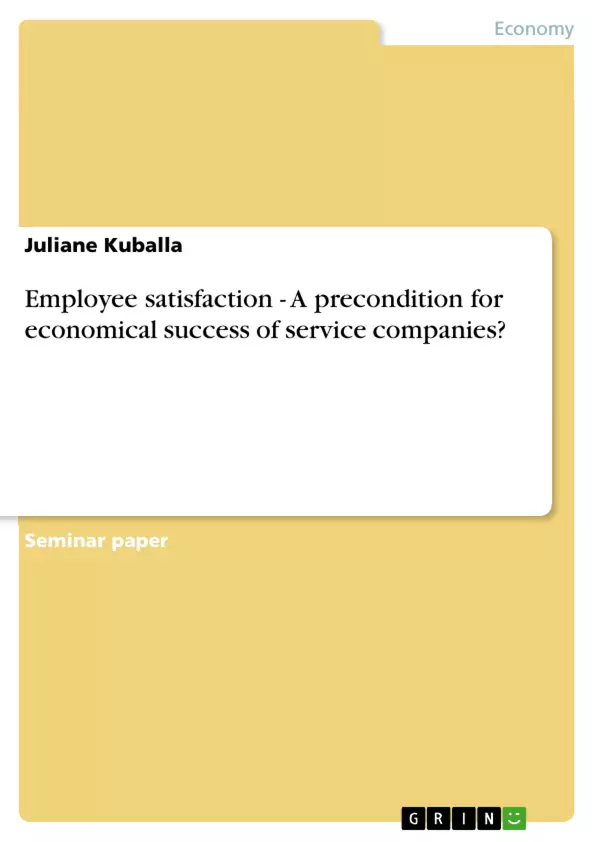Today increased globalisation and declined market conditions like decreasing brand loyalty, high levels of information transparency and fast shifting technological developments complicate the road to success for many companies. Particularly for service organisations, and the sales departments of manufacturing companies, front-line employees play a key role in securing and boosting profits under difficult market conditions as they directly interact with customers. The interaction between employees and customers is very critical as employees are mainly responsible for creating an excellent public image of the company. For that reason new management practices were developed in order to enhance customer focus as well as employee satisfaction. Many scholars argue that what happens to employees inside a company considerably affects what happens to customers outside the company. They establish a direct context between employee satisfaction, customer satisfaction and – as a pre-eminent consequence – the company’s performance.
This academic assignment demonstrates the impact of employee satisfaction on organisational performance and profitability especially in regard to companies in the service sector. The service profit chain of Hesskett et al. (1994) suggests that employee satisfaction and loyalty are the key drivers of service value, customer satisfaction, customer loyalty and profitability. Based on this model the general linkages are critically analysed in order to prove whether a positive relationship does really exist. In this context the intent is not to provide an analysis of the factors that cause employee satisfaction but the resulting effects that can be realized regarding the following components of the chain.
Inhaltsverzeichnis (Table of Contents)
- Abstract
- Introduction
- Characteristics of services
- The Service-Profit Chain
- The impact of employee satisfaction on job performance
- The impact of employee satisfaction on customer satisfaction – Mirror effect and balance theory
- The impact of customer satisfaction on customer loyalty and the company's performance
- Shortcomings of the service-profit chain
- Conclusion
- References
Zielsetzung und Themenschwerpunkte (Objectives and Key Themes)
This article aims to demonstrate the impact of employee satisfaction on organisational performance and profitability, particularly in the service sector. It analyzes the service profit chain model, suggesting that employee satisfaction and loyalty drive service value, customer satisfaction, customer loyalty, and profitability. The article critically examines the relationships between these elements, aiming to prove the existence of a positive correlation.
- The impact of employee satisfaction on organizational performance
- The role of the service profit chain in driving profitability
- The relationship between employee satisfaction and customer satisfaction
- The importance of customer focus and employee empowerment in the service sector
- The need for internal marketing strategies to enhance employee commitment and customer satisfaction
Zusammenfassung der Kapitel (Chapter Summaries)
- Abstract: This section introduces the article's focus on employee satisfaction and its impact on organizational success in the service sector. It highlights the importance of employee-customer interaction in shaping company image and achieving profitability in challenging market conditions.
- Introduction: This section emphasizes the critical role of customer satisfaction in today's competitive environment. It discusses the shift from relying on product quality and innovation to focusing on meeting individual customer expectations. The section emphasizes the importance of employee satisfaction in the service sector, where they represent the company and directly interact with customers.
- Characteristics of services: This section delves into the unique characteristics of services, emphasizing their intangible nature and the importance of the human factor in service delivery. It explains how service quality is shaped by the interaction between employees and customers, and how employee actions can directly influence customer perception and company image.
- The Service-Profit Chain: This section introduces the service-profit chain model, developed by Heskett et al. (1994), which posits a direct link between employee satisfaction, customer satisfaction, and company performance. It highlights the key drivers of service value, including employee satisfaction and loyalty, and their impact on customer loyalty and profitability.
- The impact of employee satisfaction on job performance: This section explores the connection between employee satisfaction and their job performance. It argues that satisfied employees are more likely to be motivated, engaged, and productive, contributing to improved overall company performance.
- The impact of employee satisfaction on customer satisfaction – Mirror effect and balance theory: This section examines the "mirror effect" and "balance theory," which suggest that employee satisfaction directly influences customer satisfaction. Satisfied employees are more likely to provide positive service experiences, leading to higher customer satisfaction levels.
Schlüsselwörter (Keywords)
The primary keywords and focus topics of this article include employee satisfaction, customer satisfaction, service profit chain, organizational performance, profitability, service sector, internal marketing, customer focus, employee empowerment, and the mirror effect.
Frequently Asked Questions
What is the Service-Profit Chain?
The Service-Profit Chain is a model that establishes direct links between employee satisfaction, customer loyalty, and financial profitability in service organizations.
How does employee satisfaction affect customer satisfaction?
Satisfied employees are more motivated and engaged, leading to better service delivery. This creates a "mirror effect" where positive employee attitudes lead to positive customer experiences.
Why is the human factor critical in the service sector?
In services, the production and consumption happen simultaneously. The front-line employee represents the company, and their interaction with the customer defines the perceived service quality.
What is the impact of customer loyalty on profitability?
Loyal customers provide steady revenue, are less price-sensitive, and act as advocates for the company, significantly reducing marketing costs and boosting overall performance.
What are the shortcomings of the service-profit chain model?
Critics argue that the model is sometimes too simplistic, as external market factors and individual customer personalities also play a significant role in determining satisfaction and loyalty.
- Citar trabajo
- Juliane Kuballa (Autor), 2006, Employee satisfaction - A precondition for economical success of service companies?, Múnich, GRIN Verlag, https://www.grin.com/document/66942



